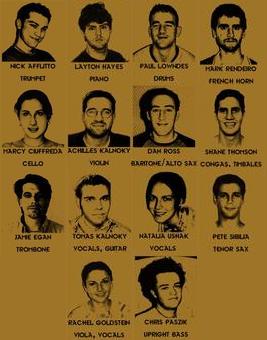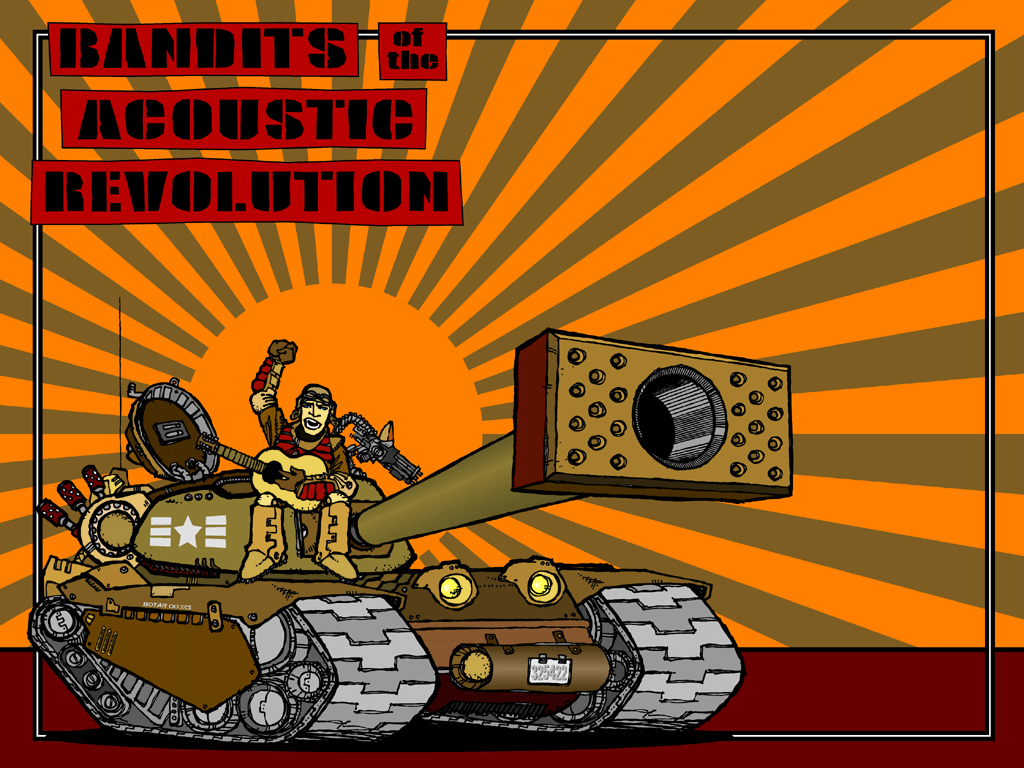Another Kind of Currency: Do We Paint Our Own Propaganda?
October 1, 2014
Hi! So, judging by the facts that a.) You’ve never seen my face or name before, b.) This column is new to WVAU, and c.) I’m currently working on facial hair cultivation, you may have gathered that I am a freshman. You wouldn’t be wrong!
But enough about that. Let’s get to my column. Its title, “Another Kind of Currency” is not only a reference to “In a Big CityÛ by Titus Andronicus, but is also based on a personal philosophy of mineÛÓthat knowledge and understanding is another kind of currency that can be used to better our lives apart from the standard currency we use every single day. Going off of that, this column will focus on “close readings” of my favorite albums and songsÛÓa mixture of new releases and classicsÛÓshowing the themes, motifs, and meanings present in the lyrics.
A minor disclaimer: Any claims or statements made within are based on and/or derived from the opinions of the lyricists and do not necessarily reflect those of myself, the staff of WVAU, American University, or any combination thereof.

Courtesy of Earn This
The Bandits of the Acoustic Revolution, an entirely acoustic side-project lead by Tomas Kalnoky (of Streetlight Manifesto fame) that only released a critically acclaimed 5-track EP, entitled A Call to Arms, in 2001, is the band responsible for the song we’re focusing on today. Its title? “They Provide the Paint for the Picture-Perfect Masterpiece That You Will Paint on the Inside of Your Eyelids.Û
It closes the EP and leaves it on a very thought-provoking note. Like much of Kalnoky’s lyrical output (and the imagery that accompanies nearly all BOTAR merch), the song has a recurring anti-war theme.
Lyrics like:
He wanted to be a soldier in the next great war/He wanted to kill and fight and maim but not be told what he was fighting for
directly and obviously contribute to this message, but there are others that are more subtle. The lyrics that immediately precede those and contain the title manage to make subtle commentary on propaganda and the image typically painted of war heroes:
They provide the paint for the picture-perfect masterpiece/That you will pant on the inside of your eyelids/Can you possibly see anything you want to see? No! Hell No! There’s nothing wrong with the way I see!
Here, “They” can be any number of people: the government, the media, even our friends and family. However, instead of saying that the idea that going to war is noble is forced upon is by those around us, Kalnoky is claiming that they merely “provide the paint.” We ourselves paint the images ourselves based on the stories, opinions, and claims that we hear. While he does put the emphasis of the blame on “them,ÛÛÓwithout the paint, no picture could be paintedÛÓthe idea that we ourselves form these ideas and images portraying war as heroic is quite unique among anti-war art. “They” usually take the entirety of the blame.
Later, in the closest the song has to a chorus, Kalnoky brings up the idea that the images being painted was what “they” intended in the first place and speaking out against the war could be dangerous:
So watch your mouth/Hold your tongue/Or you’re going to make a grave mistake/Or you’re gonna catch a bullet in your head
Taken at face value, these lyrics seem to be common sense advice given in the midst of a battle: “be quiet or you’ll give away our position!” The wordplay on the word “grave” serves both this meaning as well as a less obvious, but powerful statement about the silencing of revolutionaries and dissenters. When viewed in the context of a protest song, it serves as a warning to fellow protestors to keep quiet or you’ll “catch a bullet in your head.” “They” wanted you to paint those pictures, didn’t they?
The next verse explores this further:
You follow me and you follow me but you never ask me why/And I wonder what you’re under could this be another piece of theÛ_ I don’t know I just do what they say because they say what to do in a matter of fact way/And you might just learn to stand on your own two feet/And I think that it’s neat how you learn to repeat everything that you hear in the street so well

Courtesy of Tipa-Ska
What could this person be “under” that has the narrator so perplexed? He’s not under the influence of anything but the “Picture-Perfect masterpiece” that he painted for himself (but with materials provided by “themÛ). The masterpiece that has turned him into an obedient soldier who repeats everything they hear, including being told to “watch your mouth” and “hold your tongue.” A change cannot be made when “they” are telling you to be silent about it. Rebellions cannot begin if “they” make it impossible to see anything negative about the world.
“They Provide the PaintÛ_” seems to be telling the story of an Orwellian dystopia where the Government feeds propaganda to the masses and silences any negativity, but Kalnoky twists it up a bit by providing the stories of the soldiers and why they are involved in the fightingÛÓ“they” provided paint for a “picture perfect masterpieceÛÛÓa utopia, if you willÛÓthat we ourselves painted that cannot be challenged lest we face “grave” consequencesÛÓdeath, or even worse, whatever would be in our own personal Room 101’s. This song questions the mere concept of propaganda. Are the propaganda posters and/or comics the “Picture-perfect masterpieces,” or are they the “paint?” Do we paint our own vision, or do “they” do it?
For what it’s worth, Kalnoky’s main project, Streetlight Manifesto, covered the song in on their album of covers “99 Songs of Revolution, Vol. 1:Û














